What is Psoriasis?
Psoriasis is a skin condition in which red scaly skin build-up is seen. It is an autoimmune condition in which itchy skin condition is also witnessed. Psoriasis scales are whitish silver in colour. But in worst situations, red patches can occur, which can result in bleeding too.
An average of 7 out of 10 people has Psoriasis, a long-term and chronic disease without a cure. However, treating Psoriasis is possible with the proper consultation and skincare routine. And for that, one needs to understand the condition in detail.
Types of Psoriasis
Let’s understand what the significant classifications of Psoriasis are –
-
Plaque Psoriasis
One of the most common types of Psoriasis. They usually begin with scaly, itchy, and silverish skin patterns. But they can worsen and form complete red skin. These are mostly seen in elbows, knees, lower back as well as scalp area.
-
Nail Psoriasis
As the name suggests, this is mostly seen in nails. And thus, discolouration or uncommon nail growth is seen in this psoriasis type. In this type, the nail might get loosened up in its position and fall off in the worst conditions.
-
Guttate Psoriasis
This occurs mostly as a result of bacterial infection. It is seen more often in young adults and children. Small drop-shaped lesions characterise this Psoriasis on the trunk, arms, and legs area.
-
Psoriatic Arthritis
Swollen as well as painful joints characterise this. This might cause progressive stiffness in the joint area, worsening into permanent or temporary damage.
-
Pustular Psoriasis
These are the pus-filled lesions that can occur in the hands or legs area. It can happen in both small as well as larger areas.
-
Erythrodermic Psoriasis
One of the least seen types which might occur in your entire body. This is characterised by a burning sensation or red and burning skin all over the body.
-
Inverse Psoriasis
This occurs as a result of fungal infections. Here a smooth but red skin is seen. This type of Psoriasis is mostly seen in the breast, buttocks, or groin area.
Causes of Psoriasis
Doctors are still not sure about what causes psoriasis. But years of research and studies have pointed out that there are two significant causes of psoriasis – genetics and the immune system.
Let’s understand the causes of Psoriasis in detail –
-
-
Immune System
Psoriasis is an autoimmune condition. This occurs when the white blood cells attack your own body rather than destroying bacteria and infections. This drives skin cells’ production in your body, and excess skin cells then move towards the surface area. As a result, both Psoriasis and plaques occur together.
-
Genetics
If any of your immediate family members suffer from Psoriasis, you have an increased chance of suffering from the same. But the relation between genetics and Psoriasis is not that big. As per the National Psoriasis Foundation, only 2-3% of people inherit Psoriasis as a genetic condition.
-
Other than causes, multiple factors might trigger Psoriasis. let’s have a look –
-
Stress
Stress is a major factor in driving Psoriasis. Thus, it is always advisable to stay relaxed and happy.
-
Alcohol
Heavy alcohol usage might also drive Psoriasis. Thus, people who have even mild psoriasis conditions must stay away from alcohol.
-
Medication
High blood pressure or low immune conditions might flare up Psoriasis. Some other medicines, like high blood pressure or anti-malarial medicine, also do the same.
-
Infection
In case you have a weak immune system or you are prone to skin infections, then you might even have an increased risk of Psoriasis.
How to control Psoriasis

1. Effective Weight Management – Losing weight might help in reducing the risk of psoriasis. Healthy weights help in proper blood flow, and thus it helps in controlling psoriasis.
2. Healthy Diet – Reduce animal protein intake, and you must have a more and more lean protein diet. Salmon, shrimp, sardines, walnuts, flax seeds help control psoriasis.
3. Consumption of Essential Vitamins – You must take some nutrients or supplements that are helpful in psoriasis. But it is advisable to visit a doctor before you start taking such supplements.
Even with proper nail care and attention, if the problem doesn’t resolve by itself, get it evaluated by a doctor or dermatologist. If you have cause for concern due to any pain, inflammation, swelling, or redness in your nails or around the area, book your appointment with a doctor as soon as possible.
Diagnosis of Psoriasis
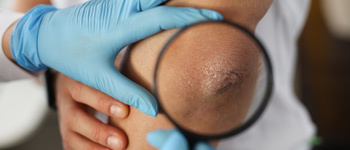
1. Physical Examination – Several dermatologists can diagnose psoriasis from the symptoms only. Red, itchy skin are the symptoms of Psoriasis, and most doctors recognise it during their consultation.
2. Biopsy – When the results are not evident in physical examination, the doctor might conduct your biopsy. Here a small sample of the skin is taken, and it is sent to the lab for analysis. This examination is done under a microscope, post which the condition and treatment options of psoriasis are discussed with the patient.
Treating Psoriasis

1. Topical Treatments – Many creams and lotions are available in the market, which might help you in this condition. Some of the best medications are – moisturiser, salicylic acid, vitamin D analogues, topical retinoids, and likewise.
2. Light Therapy – Sunlight is still considered to be one of the oldest treatments for psoriasis. But UV rays also do the same function. It destroys the extra blood cells and thus is your answer to
how to get rid of psoriasis.
The above given are some of the best treatments available right now for psoriasis. But it is always advisable to visit a dermatologist before you start any of these treatments. It is best to take advice from an expert rather than doing it yourself.
You can know more about such valuable information on skin and hair care at Skin & Hair Academy. Besides blogs and videos on ailments, you can also connect with expert dermatologists in your location for any skin/hair-related query of yours.


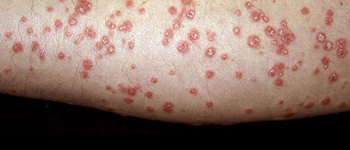 One of the most common types of Psoriasis. They usually begin with scaly, itchy, and silverish skin patterns. But they can worsen and form complete red skin. These are mostly seen in elbows, knees, lower back as well as scalp area.
One of the most common types of Psoriasis. They usually begin with scaly, itchy, and silverish skin patterns. But they can worsen and form complete red skin. These are mostly seen in elbows, knees, lower back as well as scalp area.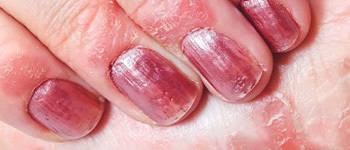 As the name suggests, this is mostly seen in nails. And thus, discolouration or uncommon nail growth is seen in this psoriasis type. In this type, the nail might get loosened up in its position and fall off in the worst conditions.
As the name suggests, this is mostly seen in nails. And thus, discolouration or uncommon nail growth is seen in this psoriasis type. In this type, the nail might get loosened up in its position and fall off in the worst conditions.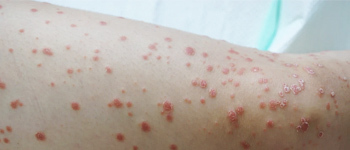 This occurs mostly as a result of bacterial infection. It is seen more often in young adults and children. Small drop-shaped lesions characterise this Psoriasis on the trunk, arms, and legs area.
This occurs mostly as a result of bacterial infection. It is seen more often in young adults and children. Small drop-shaped lesions characterise this Psoriasis on the trunk, arms, and legs area.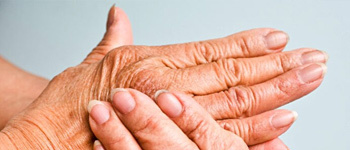 Swollen as well as painful joints characterise this. This might cause progressive stiffness in the joint area, worsening into permanent or temporary damage.
Swollen as well as painful joints characterise this. This might cause progressive stiffness in the joint area, worsening into permanent or temporary damage.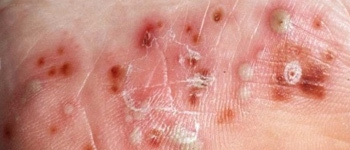 These are the pus-filled lesions that can occur in the hands or legs area. It can happen in both small as well as larger areas.
These are the pus-filled lesions that can occur in the hands or legs area. It can happen in both small as well as larger areas.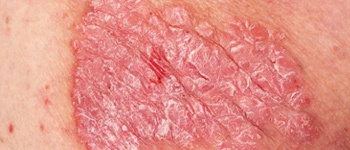 One of the least seen types which might occur in your entire body. This is characterised by a burning sensation or red and burning skin all over the body.
One of the least seen types which might occur in your entire body. This is characterised by a burning sensation or red and burning skin all over the body.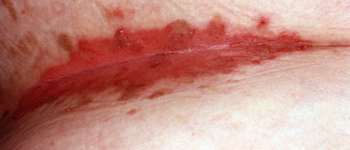 This occurs as a result of fungal infections. Here a smooth but red skin is seen. This type of Psoriasis is mostly seen in the breast, buttocks, or groin area.
This occurs as a result of fungal infections. Here a smooth but red skin is seen. This type of Psoriasis is mostly seen in the breast, buttocks, or groin area. Psoriasis is an autoimmune condition. This occurs when the white blood cells attack your own body rather than destroying bacteria and infections. This drives skin cells’ production in your body, and excess skin cells then move towards the surface area. As a result, both Psoriasis and plaques occur together.
Psoriasis is an autoimmune condition. This occurs when the white blood cells attack your own body rather than destroying bacteria and infections. This drives skin cells’ production in your body, and excess skin cells then move towards the surface area. As a result, both Psoriasis and plaques occur together.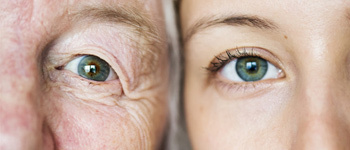 If any of your immediate family members suffer from Psoriasis, you have an increased chance of suffering from the same. But the relation between genetics and Psoriasis is not that big. As per the National Psoriasis Foundation, only 2-3% of people inherit Psoriasis as a genetic condition.
If any of your immediate family members suffer from Psoriasis, you have an increased chance of suffering from the same. But the relation between genetics and Psoriasis is not that big. As per the National Psoriasis Foundation, only 2-3% of people inherit Psoriasis as a genetic condition. Stress is a major factor in driving Psoriasis. Thus, it is always advisable to stay relaxed and happy.
Stress is a major factor in driving Psoriasis. Thus, it is always advisable to stay relaxed and happy. Heavy alcohol usage might also drive Psoriasis. Thus, people who have even mild psoriasis conditions must stay away from alcohol.
Heavy alcohol usage might also drive Psoriasis. Thus, people who have even mild psoriasis conditions must stay away from alcohol. High blood pressure or low immune conditions might flare up Psoriasis. Some other medicines, like high blood pressure or anti-malarial medicine, also do the same.
High blood pressure or low immune conditions might flare up Psoriasis. Some other medicines, like high blood pressure or anti-malarial medicine, also do the same. In case you have a weak immune system or you are prone to
In case you have a weak immune system or you are prone to 











